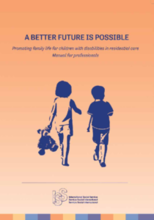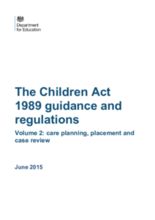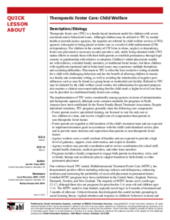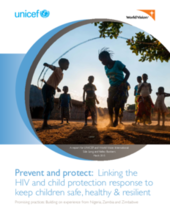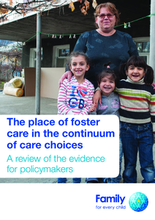Displaying 131 - 140 of 281
This manual provides guidance to professionals who work with children with disabilities in residential care.
Volume 2 of the Children Act 1989 Guidance and Regulations provides guidance, primarily addressed to local authorities and their staff in England, about their functions under Part 3 of the Children Act 1989 which concerns the provision of local authority support for children and families. In particular it describes how local authorities should carry out their responsibilities in relation to care planning, placement and case review for looked after children.
In this “Quick Lesson About Therapeutic Foster Care,” the author provides a description of, and background information on, therapeutic foster care in the United States, an overview of national statistics regarding therapeutic foster care, and an overview of the risk factors and symptoms associated with children in need of therapeutic foster care.
This study carried out in the United States used a lens of family stress theory to explore adoptive parents’ responses to unexpected characteristics of their children.
This report from UNICEF and World Vision International documents country level approaches that respond to HIV and child protection challenges facing children and adolescents by linking both those responses.
This easy to use resource from the Ministry of Gender Labour and Social Development in Uganda, in consultation with civil society, outlines a continuum of care framework for responding to vulnerable children.
The child welfare system was created to care for abused and neglected children. But too often, teenagers are landing in the system because they simply aren’t getting along with their parents. This paper traces Casey’s efforts to learn from communities that are preventing teens from landing in the system by helping families while the teen remains at home. A survey of the states, interviews with experts, secondary research and visits to several communities show common elements of successful programs.The paper presents information on related laws and policies, funding sources and programs for families while including the infrastructure and services needed to support such initiatives.
In the fall of 2007, Ramsey County Community Human Services (RCCHSD) was one of five sites chosen as recipients of a grant from the U.S. Department of Health and Human Services Children’s Bureau (USDHHS) for the“Using Comprehensive Family Assessments to Improve Child Welfare Outcomes” project, to develop a model of comprehensive family assessment to be used in child welfare.
This article discusses professional discretion in relation to placing a child outside the family, as understood by Malawian social workers.
This report from Family for Every Child explores rising concerns about the expansion of foster care services in low and middle income countries, it begins to fill the gap in understanding, and aims to assist in both states’ and NGOs’ decisions on whether to invest in foster care, and in the kinds of supportive services needed to make foster care safe and effective.

